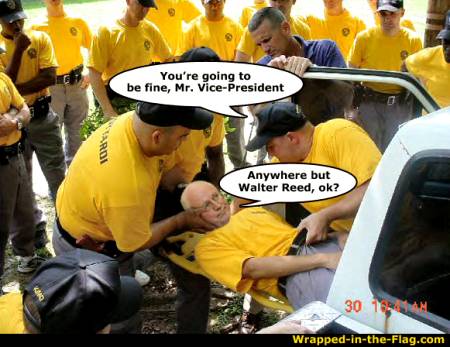Why Libby’s Pardon Is a Slam Dunk

By FRANK RICH
The New York Times
March 11, 2007
EVEN by Washington’s standards, few debates have been more fatuous or wasted more energy than the frenzied speculation over whether President Bush will or will not pardon Scooter Libby. Of course he will.
A president who tries to void laws he doesn’t like by encumbering them with “signing statements” and who regards the Geneva Conventions as a nonbinding technicality isn’t going to start playing by the rules now. His assertion last week that he is “pretty much going to stay out of” the Libby case is as credible as his pre-election vote of confidence in Donald Rumsfeld. The only real question about the pardon is whether Mr. Bush cares enough about his fellow Republicans’ political fortunes to delay it until after Election Day 2008.
Either way, the pardon is a must for Mr. Bush. He needs Mr. Libby to keep his mouth shut. Cheney’s Cheney knows too much about covert administration schemes far darker than the smearing of Joseph Wilson. Though Mr. Libby wrote a novel that sank without a trace a decade ago, he now has the makings of an explosive Washington tell-all that could be stranger than most fiction and far more salable.
Mr. Libby’s novel was called “The Apprentice.” His memoir could be titled “The Accomplice.” Its first chapter would open in August 2002, when he and a small cadre of administration officials including Karl Rove formed the White House Iraq Group (WHIG), a secret task force to sell the Iraq war to the American people. The climactic chapter of the Libby saga unfolded last week when the guilty verdict in his trial coincided, all too fittingly, with the Congressional appearance of two Iraq veterans, one without an ear and one without an eye, to recount their subhuman treatment at the Walter Reed Army Medical Center.
It was WHIG’s secret machinations more than four years ago that led directly to those shredded lives. WHIG had been tasked, as The Washington Post would later uncover, to portray Iraq’s supposedly imminent threat to America with “gripping images and stories not available in the hedged and austere language of intelligence.” In other words, WHIG was to cook up the sexiest recipe for promoting the war, facts be damned. So it did, by hyping the scariest possible scenario: nuclear apocalypse. As Michael Isikoff and David Corn report in “Hubris,” it was WHIG (equipped with the slick phrase-making of the White House speechwriter Michael Gerson) that gave the administration its Orwellian bumper sticker, the constantly reiterated warning that Saddam’s “smoking gun” could be “a mushroom cloud.”
Ever since all the W.M.D. claims proved false, the administration has pleaded that it was duped by the same bad intelligence everyone else saw. But the nuclear card, the most persistent and gripping weapon in the prewar propaganda arsenal, was this White House’s own special contrivance. Mr. Libby was present at its creation. He knows what Mr. Bush and Dick Cheney knew about the manufacture of this fiction and when they knew it.
Clearly they knew it early on. The administration’s guilt (or at least embarrassment) about its lies in fomenting the war quickly drove it to hide the human price being paid for those lies. (It also tried to hide the financial cost of the war by keeping it out of the regular defense budget, but that’s another, if related, story.) The steps the White House took to keep casualties out of view were extraordinary, even as it deployed troops to decorate every presidential victory rally and gave the Pentagon free rein to exploit the sacrifices of Jessica Lynch and Pat Tillman in mendacious P.R. stunts.
The administration’s enforcement of a prohibition on photographs of coffins returning from Iraq was the first policy manifestation of the hide-the-carnage strategy. It was complemented by the president’s decision to break with precedent, set by Ronald Reagan and Jimmy Carter among others, and refuse to attend military funerals, lest he lend them a media spotlight. But Mark Benjamin, who has chronicled the mistreatment of Iraq war veterans since 2003, discovered an equally concerted effort to keep injured troops off camera. Mr. Benjamin wrote in Salon in 2005 that “flights carrying the wounded arrive in the United States only at night” and that both Walter Reed and the National Naval Medical Center in Bethesda barred the press “from seeing or photographing incoming patients.”
A particularly vivid example of the extreme measures taken by the White House to cover up the war’s devastation turned up in The Washington Post’s Walter Reed exposé. Sgt. David Thomas, a Tennessee National Guard gunner with a Purple Heart and an amputated leg, found himself left off the guest list for a summer presidential ceremony honoring a fellow amputee after he said he would be wearing shorts, not pants, when occupying a front-row seat in camera range. Now we can fully appreciate that bizarre incident on C-Span in October 2003, when an anguished Cher, of all unlikely callers, phoned in to ask why administration officials, from the president down, were not being photographed with patients like those she had visited at Walter Reed. “I don’t understand why these guys are so hidden,” she said.
The answer is simple: Out of sight, out of mind was the game plan, and it has been enforced down to the tiniest instances. When HBO produced an acclaimed (and apolitical) documentary last year about military medics’ remarkable efforts to save lives in Iraq, “Baghdad ER,” Army brass at the last minute boycotted planned promotional screenings in Washington and at Fort Campbell, Ky. In a memo, Lt. Gen. Kevin Kiley warned that the film, though made with Army cooperation, could endanger veterans’ health by provoking symptoms of post-traumatic stress disorder.
The General Kiley who was so busy policing an HBO movie for its potential health hazards is the same one who did not correct the horrific real-life conditions on his watch at Walter Reed. After the Post exposé was published, he tried to spin it by boasting that most of the medical center’s rooms “were actually perfectly O.K.” and scapegoating “soldiers leaving food in their rooms” for the mice and cockroach infestations. That this guy is still surgeon general of the Army — or was as of Friday — makes you wonder what he, like Mr. Libby, has on his superiors.
Now that the country has seen the Congressional testimony of Specialist Jeremy Duncan, who has melted flesh where his ear once was, or watched the ABC newsman Bob Woodruff’s report on other neglected patients in military medical facilities far beyond Walter Reed, the White House cover-up of veterans’ care has collapsed, like so many other cover-ups necessitated by its conduct of this war. But the administration and its surrogates still won’t face up to their moral culpability.
Mary Matalin, the former Cheney flack who served with Mr. Libby on WHIG and is now on the board of his legal defense fund (its full list of donors is unknown), has been especially vocal. “Scooter didn’t do anything,” she said. “And his personal record and service are impeccable.” What Mr. Libby did — fabricating nuclear threats at WHIG and then lying under oath when he feared that sordid Pandora’s box might be pried open by the Wilson case — was despicable. Had there been no WHIG or other White House operation for drumming up fictional rationales for war, there would have been no bogus uranium from Africa in a presidential speech, no leak to commit perjury about, no amputees to shut away in filthy rooms at Walter Reed.
Listening to Ms. Matalin and her fellow apparatchiks emote publicly about the punishment being inflicted on poor Mr. Libby and his family, you wonder what world they live in. They seem clueless about how ugly their sympathy for a conniving courtier sounds against the testimony of those wounded troops and their families who bear the most searing burdens of the unnecessary war WHIG sped to market.
As is often noted, any parallels between Iraq and Vietnam do not extend to America’s treatment of its troops. No one spits at those serving in Iraq. But our “support” for the troops has often been as hypocritical as that of an administration that still fails to provide them with sufficient armor. Health care indignities, among other betrayals of returning veterans, have been reported by countless news organizations since the war began, not just this year. Many in Congress did nothing, and we as a people have often looked the other way, supporting the troops with car decals and donated phone cards while the same history repeats itself again and again.
Now the “surge” that was supposed to show results by summer is creeping inexorably into an open-ended escalation, even as Moktada al-Sadr’s militia ominously melts away, just as Iraq’s army did after the invasion in 2003, lying in wait to spring a Tet-like surprise. And still, despite Thursday’s breakthrough announcement of a credible Iraq exit blueprint by the House leadership, Congress threatens to dither. While Mr. Bush will no doubt pardon Scooter Libby without so much as a second thought, anyone else in Washington who continues to further this debacle may find it less easy to escape scot-free.



























